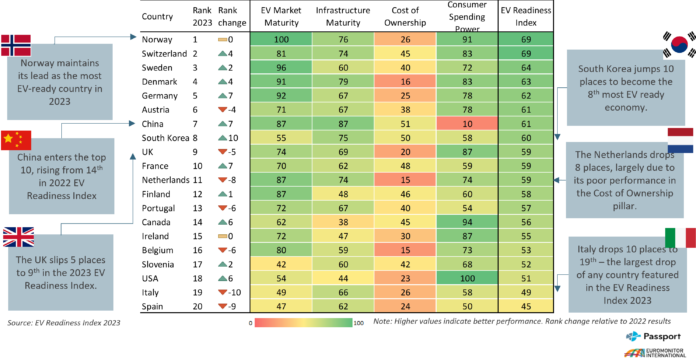Euromonitor International’s Electric Vehicle Readiness Index for 2023 reveals the best prepared global markets
- Norway, Switzerland and Sweden are top performers largely thanks to the countries’ high EV uptake
- China and South Korea rise up the rankings in strong showing for key Asian markets
- UK biggest year-on-year faller inside top 10 as surging cost of electricity starts to bite
- Brazil, South Africa and India rank at the bottom due to the lack of EV infrastructure, weak purchasing power and maintenance differences between EV and ICE (internal combustion engine) vehicles
- Europe dominates the index with eight out of the top 10 countries
LONDON, UK – Market research company Euromonitor International has released its annual Electric Vehicle Readiness Index for 2023 indicating the best prepared global markets for the electric vehicle (EV) transition.
Norway, Switzerland and Sweden rank at the top of the index which is largely thanks to the countries’ EV market maturity and the overall buying power of consumers.
However, the EV transition remains a challenge for many emerging and developing economies including Brazil, South Africa and India.
All three countries ranked at the bottom of the 2023 index as limited government incentives, low incomes and the undersupply of public charging stations have discouraged businesses and consumers from making the transition. In 2022, new EV registrations in the three countries collectively averaged less than 1%.
Norway leads the way as Europe dominates the rankings
For the second year running, Norway was the best prepared EV market in 2023. In 2022, plug-in electric vehicles in Norway accounted for 89% of new passenger car registrations – the highest of any country and well ahead of other leading EV economies: Sweden (56% of new EV registration in 2022), Denmark (39%) and Finland (38%).
Norway also had the highest density of EVs, with 28.5 plug-ins per 1,000 population in 2022, making it the global leader for EV take-up per population.
Germany improved its position by seven places in the EV Readiness Index 2023, with its positive performance was boosted by a strong EV uptake. It received the 3rd highest score in the Market Maturity pillar as consumer demand for low-emission vehicles grew. In 2022, 32% of new passenger car registrations were electric (either Battery EVs or Plug-In Hybrid EVs) – a six percentage point improvement over the previous year.
The UK had the biggest drop in the top 10 list. The country slipped five places to 9th mainly due to the rising cost of electricity in the country. As the price of residential electricity in the UK in 2021-2022 grew by 49%, the ownership of EVs became increasingly more expensive.
Fransua Vytautas Razvadauskas, Insights Manager, Mobility at Euromonitor International, said: “Norway’s high position in the EV Readiness Index also reflects the encouraging performance of Western European economies, which accounted for eight of the top 10. High consumer affluence, government incentives and clear sustainability goals have helped the region dominate EV take-up. An example could be the EU which set clear targets to ban the sale of new internal combustion engine vehicles and accelerate the EV transition by 2035.”
China shoots up the rankings as EV investment surges
China reached seventh place in the 2023 EV Readiness Index, improving by seven places compared to 2022. This is largely because of the country’s strong investment in public charging infrastructure, which has encouraged the EV transition.
China remains the largest EV market globally and is forecast to account for 61% of the global sales in 2023. Overall, China’s EV sales are forecast to grow by 16% in 2023 to almost 8 million units. In 2022, China was home to 1.8 million public charging stations, accounting for approximately 65% of global supply.
Razvadauskas added: “Importantly, China has seen a swift rise in fast charging stations, providing charging power of more than 22kW, which has helped fuel greater consumer confidence in buying an EV. In 2022, 43% of all public charging stations were fast – up from 41% in 2021. In addition, it recorded the highest ratio of fast chargers per 100km of highway, reaching 534 in 2022.”
New EV registrations to hit 20% market share in 2023
New EV registrations are forecast to expand by 19% globally and reach 13 million units in 2023. Positive factors, including increased supply and availability of electric vehicles, government subsidies and improving charging infrastructure, are helping to sustain growth. However, in comparison to previous years, EV sales is slowing down. In 2021, the market saw 105% growth with 6,5 million new EV registrations, in 2022 the growth reached 68% expanding the market to 11 million units.
“Increased competition in the EV market and consequent price cuts are helping to attract more buyers, however, while growth in the EV market continues, it is slowing, as market maturity and EV saturation increases. In addition, worsening economic conditions, the cost-of-living crisis and higher interest rates are making it more difficult for consumers to purchase new vehicles,” concluded Razvadauskas.
Euromonitor’s EV Readiness Index, published for the second year, focuses on evaluating the most prepared markets to welcome EVs across 40 countries. The countries included account for approximately 90% of the total automotive market globally. The EV Readiness Index is measured across four pillars: Market Maturity, Infrastructure Maturity, Cost of Ownership and Consumer Spending Power.







